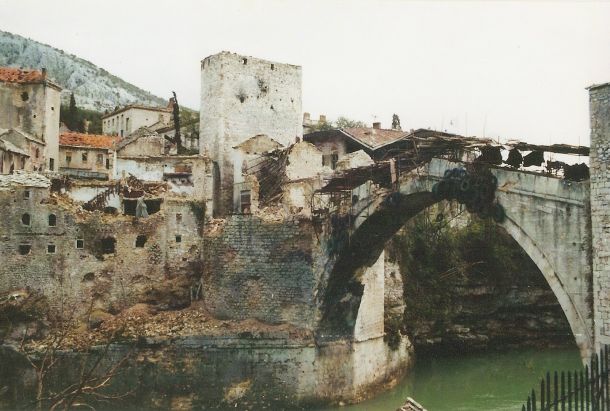In March of 1992, Bosnia and Herzegovina declared its independence from Yugoslavia and for the next 3 1/2 years, went through a bloody war. In July of 1995, Srebrenica (a Bosnian town on the border of Serbia) was the town of genocide as Bosnian-Serb forces tried to ethnically cleanse the area through rape, pillage, torture, etc. In December of 1995, the war had ended, and Bosnia and Herzegovina was its own country. On October 15th, 2013, Bosnia and Herzegovina reached the World Cup for the first time in its history. How far a nation of over 4 million and with a diaspora of around 2 million has come in 21 years; from playing its first ever FIFA-recognized match in November 1995 to qualifying for the World Cup.
As mentioned above, Bosnia went through a gruesome experience during the war. Mostly because it was the most ethnically diverse republic in Yugoslavia; In 1991, 44% were Muslim, 31% were Serbs and 17% were Croatians. All three ethnic groups have a different religion/denomination - the Bosnians were Muslim, Serbs were Eastern Orthodox, and the Croats were Catholics. All three ethnic groups fought against one another throughout the war as they destroyed one another's homes, villages, families, etc. The country was torn apart by the entire war; over 250,000 Bosniaks (Bosnian Muslims) lost their lives. The city of Sarajevo was under siege for most, if not all, of the war. The city is geographically in a valley and is surrounded by mountains/hilltops on all sides. The majority of people living inside the city were Bosniaks and the majority of people occupying the mountains were Serbs. The Serb forces constantly fired rockets, missiles, shots, etc. onto the city in hopes of taking it over. The Bosnian Army and civilians weathered the storm (for the most part) and retained their capital city. Srebrenica, a small town on the border of Serbia, is one of the most known places in the world due to it's experience in the war. In July of 1995, Serb forces rolled in and took over the "UN Safe Zone", it was practically handed over to them by the nine Dutch peacekeepers deployed there. What would happen over the next days/weeks cannot be described in words. The majority of the towns population was brutally annihilated by the Serb forces, all kinds of atrocities occurred (rape, executions, etc.). Other towns/cities such as Prijedor went through similar massacres and genocides during the war. The policy of "ethnic cleansing" implemented by Serb forces had led to thousands losing their innocent lives in the worst way possible. Nonetheless, the turmoil and tensions had been relieved (to some degree) in December of 1995. The Dayton Peace Accords had successfully ended the war and split the country of Bosnia and Herzegovina into two; a Bosnian-Croat Federation and a Serb "Republika Srpska". The two entities, politically, go back and forth constantly, and earlier this year were pitted against one another during the "JMBG" protests.
However, all the problems in the country had ceased when Safet Susic and his Zmajevi topped their group and reached the World Cup. Most of the country rejoiced and took to the streets to celebrate the massive achievement. The players returned a few hours after the final whistle in Lithuania to join the country in the fest. It was one of the best days in the country's history and will always be fondly remembered. But, how exactly did Bosnia get to the World Cup?
The question can be answered in two ways; the short way and the long way. The short way is "they won the group". The long way is: Bosnia's previous struggles to qualify for a major tournament. Bosnia narrowly missed out on the 2004 European Cup (Euro) after a 1-1 draw with Denmark, a win would have given them qualification. Then in 2006, the Bosnians finished 2 points behind Spain for a spot in the tournament in Germany. Many feel they were robbed as Spain scored a 98th minute winner through Carlos Marchena at the Mestalla to equalize after Zvjezdan Misimovic scored in the 40th minute. The referee had signalled for 6 additional minutes, which is why so many were outraged. In 2008, Bosnia could have qualified as they were second in the group at one point, but disagreements between players and the federation led to many quitting the team. In 2010, Bosnia finished 2nd in their group behind Spain and had qualified for the playoffs. They drew Portugal and suffered a pair of hard fought defeats both home and away. Both matches finished 1-0 to Portugal (Bruno Alves and Raul Meireles were goalscorers). In 2012, Bosnia narrowly missed out on first place as France had beaten them to it. Bosnia once again qualified for the playoffs and once again drew Portugal. After an entertaining 0-0 draw in Zenica, Bosnia suffered a rough 6-2 defeat in Portugal. Many were outraged about that campaign considering they were denied a penalty late on in Paris while France received one after Spahic seemed to have fouled Nasri outside the box. Now, however, is Bosnia's chance to put all that aside and make history.
However, it was different this time around. Bosnia had drawn Greece, Lithuania, Liechtenstein, Latvia and Slovakia for qualification to the 2014 World Cup in Brazil. The Bosnia and Herzegovina national side started the qualifiers with an expected 1–8 away victory over minnows Liechtenstein, recording the equal largest victory for the side to date. This was followed with a 4–1 win against Latvia at home in Zenica. Bosnia-Herzegovina concluded their qualifiers in 2012 undefeated and placed at the top of Group G on goal difference ahead of Greece, doing so for the first time in their history, having come away with a 0–0 draw in Piraeus, Greece, and winning 3–0 at home over Lithuania in Zenica during the October qualifiers. Then Bosnia thumped group favourites Greece 3–1 with Edin Džeko scoring twice in the game. Džeko took the man-of-the-match award. This was Bosnia's first ever victory over Greece in 7 meetings. This followed with a 5–0 win in Riga, Latvia. This followed with a shock 0–1 loss to Slovakia at home in Zenica and the first loss for Bosnia in the qualifiers. Only four days later however, Bosnia managed to reverse the result thanks to a come from behind away 1–2 victory in Žilina enabling the team to remain placed first in Group G keeping them in a strong position to qualify for World Cup in Brazil as group winners ahead of Greece. Both goals for Bosnia were scored by players new to the national side, Ermin Bičakčić (third cap, first goal) and Izet Hajrović (second cap, first goal). Bosnia then routinely beat Lichtenstein 4-1 at home before they qualified for the 2014 World Cup in Brazil for the first time in their history by beating Lithuania 1–0 in Kaunas on 15 October 2013. The national team finished level on 25 points with Greece at the top of Group G, but the superior goal difference earned the top spot and an automatic place in the finals.
As aforementioned, the celebrations were immediate, thousands took to the streets in Sarajevo to welcome the team home while hundreds/thousands in other cities also celebrated the massive feat. However, there was a problem; two fans (one survived) who were driving home to Bosnia from Lithuania had died in a vehicular accident. The three fans were part of the fan group known as "Ljuti Krajisnici". A funeral was held shortly following the incident, and thousands came to mourn the death of the men and the most notable person there was captain Emir Spahic.
That's Bosnia's Road to the World Cup.










































